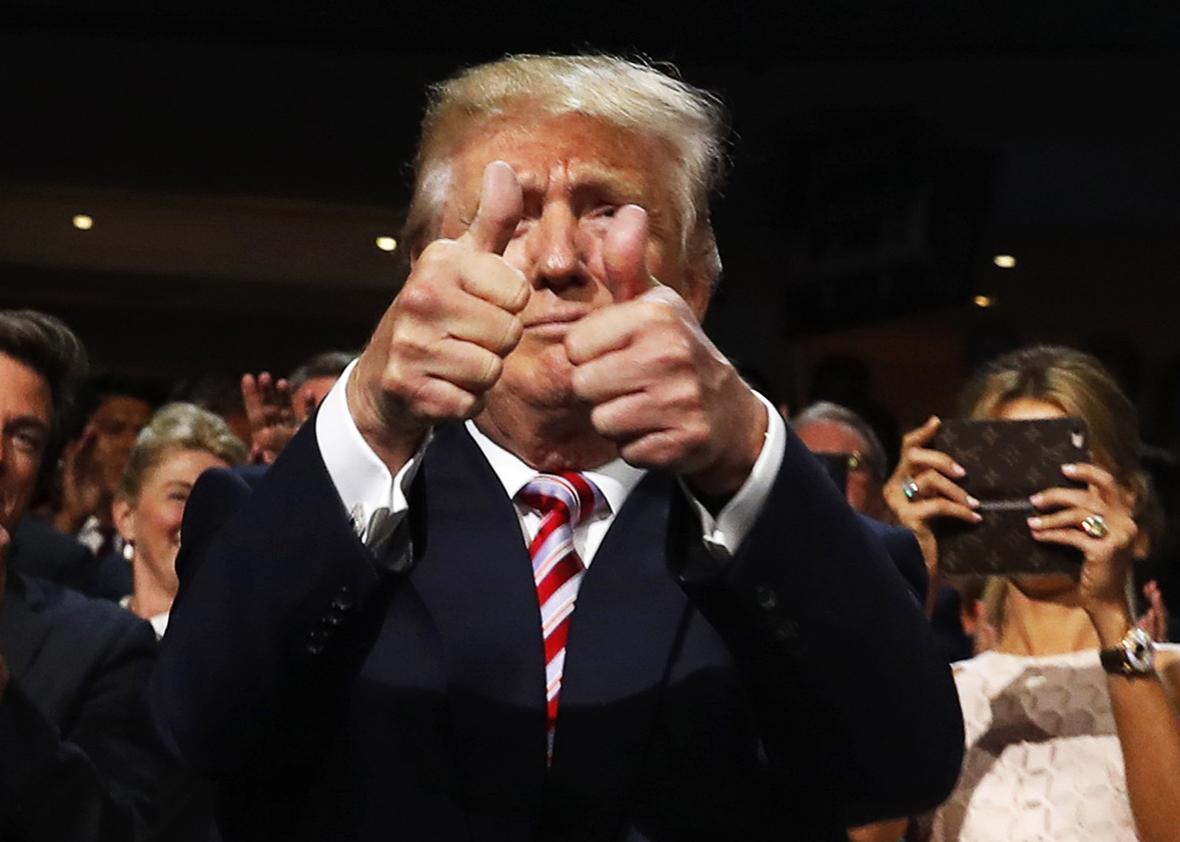This Republican National Convention was supposed to be different. And not because of the fantasy of Never Trumpers that the convention would somehow be contested, a dream that finally died on Monday on the floor of the Quicken Loans Arena. The RNC was supposed to be different because it was in the hands of the great showman Donald Trump, who would use his vaunted reality TV know-how to give the RNC a glitzy makeover. Trump was going to make conventions great again.
Instead, through three nights, the RNC has faltered both as well-executed live television and as a Trump-burnishing spectacular. For the first two nights, the schedule was mismanaged, so that lesser speakers, speaking before an empty arena, were at the podium during the 10 p.m. hour, when the convention is broadcast on the major networks, not just the cable ones. On Tuesday night, Chris Christie gave the most rousing speech about imprisoning one’s political enemies in recent American history, but the “lock her up” chant was heard only by cable watchers, while the Lucifer-fearing Ben Carson and soap star/avocado farmer Kimberlin Brown were given the plumb spots after Trump’s children. If Tim Tebow’s announcement last week clarifying that he wasn’t speaking at the convention didn’t suggest the behind-the-scenes disarray, Scott Baio needlessly announced in his speech that he had only been invited the week before. The very presence of New Yawker Andy Wist at the podium suggested far more people than Serena Williams had turned down Trump’s offer to speak at the convention; the number of speakers who have barely said Trump’s name suggests that many who accepted that offer did so half-heartedly. And this is to say nothing of the convention’s two most momentous events thus far, both of which took attention away from Trump—Melania’s cribbed speech, an idiotic blunder that subsumed the first two days of the convention thanks to Trump’s team’s mishandling of it, and Ted Cruz’s nonendorsement of Trump, a nonendorsement the Trump team was informed would happen two days ago.
The legendary televisual panache attributed to Trump has been apparent only fleetingly, as when the New York delegation was saved for last so Trump’s son could put his father over the top, at which point “New York, New York” began playing on the speakers and the phrase “Over the Top” appeared on the jumbotron. It was also on display when Trump walked into the arena during Cruz’s nonendorsement and then stood furious and stone-faced in the arena, egging on the crowd’s “Say it” with a pump of his fist. Despite telling the New York Times earlier this month that he had turned down the request to appear at the convention on all three nights before Thursday, Trump has appeared all three nights. “I don’t want people to think I’m grandstanding,” he told the Times, “but it would get high ratings.” Ratings for the convention through two nights are slightly lower than they were in 2012.
The idea that Trump was ever going to jazz up the convention with his Big Top acumen reflects a fundamental misunderstanding of reality TV, the conventions of which are nearly anathema to a smoothly running four-night political convention. As with so many of Trump’s credentials, the skills he has learned from each item on his résumé have been blown out of proportion: Because he is a tough negotiator, he’s got a handle on ISIL; because he was on a reality TV show, he knows how to stage a well-choreographed, entertaining live event. A reality show is not a meticulously planned pageant full of showbiz sparkle. Instead, it is a rote event reliably punctuated by histrionics that often make everyone look bad. Reality TV shows are mostly boring. To crib a momentarily popular number, you might even say they are 93 percent predictable. This is why they work so well as zonk-out-on-the-couch, comfort television. They are full of familiar types going about a set of pre-ordained tasks and the end of every episode, a Kardashian giggles in an appealingly human way, someone gets a rose, advances to the next round, or gets fired. These routines are punctuated by moments of “drama” that become the focus of the episode no matter how tame they are, dissected and discussed and rebroadcast until the next week. Contra the genre’s wild reputation, the success of reality TV is mostly a testament to the incredible patience human beings have for the minutiae of one another, not our insatiable appetite for the hedonistic and salacious.
The RNC has hewed very closely to a reality show, which is not particularly good for the RNC. It has featured lots of dullness and predictability, characters zealously letting it all hang out on camera (Giuliani, Carson), and a near total fixation on the villain—in this case Hillary Clinton. Small dramas have been blown up into entire episodes: Reality TV producers could not have extended the Melania goof any better than the Trump team, who seems to believe, like reality TV producers, that all drama is good drama, though Trump prefers to phrase it as “all press is good press.” Producers also could not have handled the Cruz’s nonendorsement better, with Trump’s team planning to stage a faceoff between Cruz and Trump that ended with Cruz and Trump literally facing off on the jumbotron split screen. If all attention is good attention, then the Melania and Cruz kerfuffles have made the convention: made it memorable, made it splashy. But they, along with the relentless focus on Hillary’s failings, instead of Trump’s credentials, have taken the focus off Trump. If Trump is the master of reality TV he claims to be, he knows that no one remembers the winner. They remember the villain, the cheater, the scandal, the flopper. He’s set the bar for his speech tonight pretty high.
